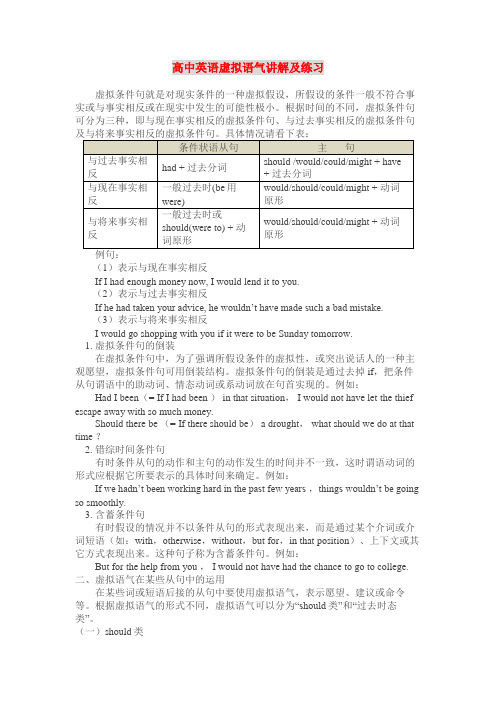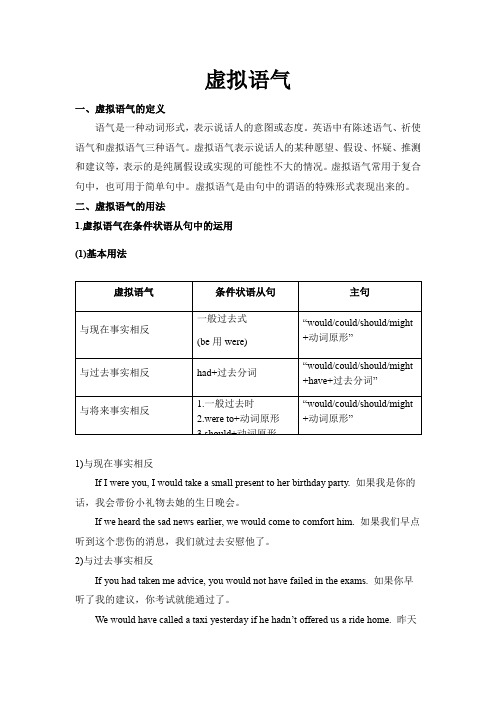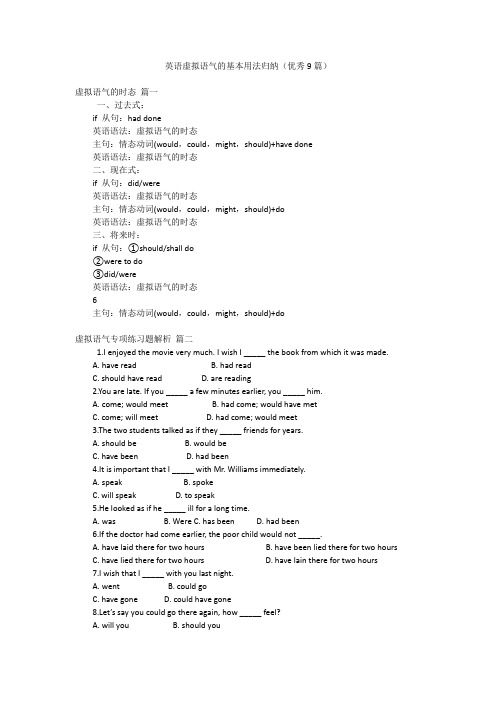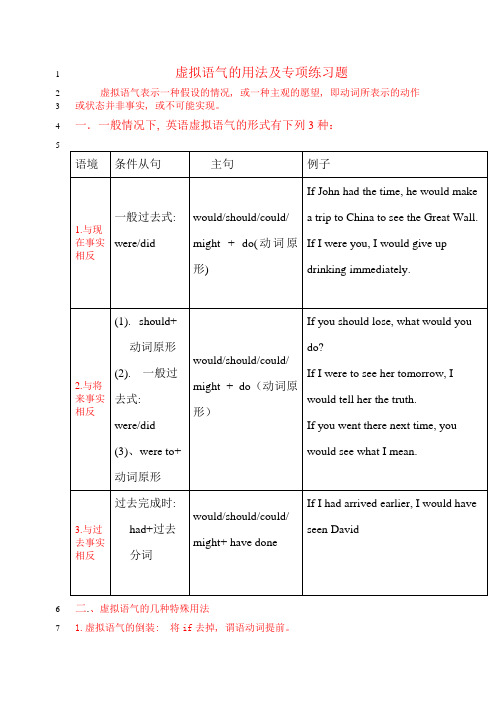虚拟语气用法讲解及练习
虚拟语气解析以及练习题答案详细解答

虚拟语气解析及练习与答案详解虚拟语气一、虚拟语气的运用练习题及答案解释The millions of calculations involved, had they been done by hand,______all practical value by the time they were finished.A.could loseB. would have lostC. might loseD. ought to have lost解析:这个句子中含有一个省略if,把助动词提前到主语they之前的虚拟条件句,该条件句表示对过去情况的假设,而主句中by the time they were finished表明主句也应该是对过去发生的情况的假设,因而应该选(B)would have lost为正确答案。
2. Had Paul received six more votes in the last election, he our chairman now.A. must have beenB. would have beenC. wereD. would be解析:这道题目是一个混合虚拟语气的句子。
条件句省略了if,把助词had提前到主语前面,表示对过去情况的假设,而主句中now表明了对现在情况的假设,所以应选would(should, could, might)+动词原形这种表达形式。
四个选项中只有(D)是正确表达形式,故为正确答案。
3. If you Jerry Brown until recently, you’d think the photograph on the right was strange.A. shouldn’t contactB. didn’t contactC. weren’t to contactD. hadn’t contacted解析:until recently,因此(D)是正确答案,而主句是隐含的对现在情况的假设,该句是一个混合虚拟条件句。
高中英语虚拟语气讲解及练习带答案

高中英语虚拟语气讲解及练习虚拟条件句就是对现实条件的一种虚拟假设,所假设的条件一般不符合事实或与事实相反或在现实中发生的可能性极小。
根据时间的不同,虚拟条件句可分为三种,即与现在事实相反的虚拟条件句、与过去事实相反的虚拟条件句(1)表示与现在事实相反If I had enough money now, I would lend it to you.(2)表示与过去事实相反If he had taken your advice, he wouldn’t have made such a bad mistake.(3)表示与将来事实相反I would go shopping with you if it were to be Sunday tomorrow.1. 虚拟条件句的倒装在虚拟条件句中,为了强调所假设条件的虚拟性,或突出说话人的一种主观愿望,虚拟条件句可用倒装结构。
虚拟条件句的倒装是通过去掉if,把条件从句谓语中的助动词、情态动词或系动词放在句首实现的。
例如:Had I been(= If I had been ) in that situation, I would not have let the thief escape away with so much money.Should there be (= If there should be) a drought, what should we do at that time ?2. 错综时间条件句有时条件从句的动作和主句的动作发生的时间并不一致,这时谓语动词的形式应根据它所要表示的具体时间来确定。
例如:If we hadn’t been working hard in the past few years ,thing s wouldn’t be going so smoothly.3. 含蓄条件句有时假设的情况并不以条件从句的形式表现出来,而是通过某个介词或介词短语(如:with,otherwise,without,but for,in that position)、上下文或其它方式表现出来。
高中英语虚拟语气讲解及练习附答案解析

高中英语虚拟语气讲解及练习虚拟条件句就是对现实条件的一种虚拟假设,所假设的条件一般不符合事实或与事实相反或在现实中发生的可能性极小。
根据时间的不同,虚拟条件句可分为三种,即与现在事实相反的虚拟条件句、与过去事实相反的虚拟条件句(1)表示与现在事实相反If I had enough money now, I would lend it to you.(2)表示与过去事实相反If he had taken your advice, he wouldn’t have made such a bad mistake.(3)表示与将来事实相反I would go shopping with you if it were to be Sunday tomorrow.1. 虚拟条件句的倒装在虚拟条件句中,为了强调所假设条件的虚拟性,或突出说话人的一种主观愿望,虚拟条件句可用倒装结构。
虚拟条件句的倒装是通过去掉if,把条件从句谓语中的助动词、情态动词或系动词放在句首实现的。
例如:Had I been(= If I had been ) in that situation, I would not have let the thief escape away with so much money.Should there be (= If there should be) a drought, what should we do at that time ?2. 错综时间条件句有时条件从句的动作和主句的动作发生的时间并不一致,这时谓语动词的形式应根据它所要表示的具体时间来确定。
例如:If we hadn’t been working hard in the past few years ,thing s wouldn’t be going so smoothly.3. 含蓄条件句有时假设的情况并不以条件从句的形式表现出来,而是通过某个介词或介词短语(如:with,otherwise,without,but for,in that position)、上下文或其它方式表现出来。
高中英语虚拟语气讲解及练习(无答案)

虚拟语气一、虚拟语气的定义语气是一种动词形式,表示说话人的意图或态度。
英语中有陈述语气、祈使语气和虚拟语气三种语气。
虚拟语气表示说话人的某种愿望、假设、怀疑、推测和建议等,表示的是纯属假设或实现的可能性不大的情况。
虚拟语气常用于复合句中,也可用于简单句中。
虚拟语气是由句中的谓语的特殊形式表现出来的。
二、虚拟语气的用法1.虚拟语气在条件状语从句中的运用(1)基本用法1)与现在事实相反If I were you, I would take a small present to her birthday party. 如果我是你的话,我会带份小礼物去她的生日晚会。
If we heard the sad news earlier, we would come to comfort him. 如果我们早点听到这个悲伤的消息,我们就过去安慰他了。
2)与过去事实相反If you had taken me advice, you would not have failed in the exams. 如果你早听了我的建议,你考试就能通过了。
We would have called a taxi yesterday if h e hadn’t offered us a ride home. 昨天如果他不让我们搭车回家的话,我们就会叫出租车了。
3)与将来事实相反:If it should snow tomorrow, they couldn’t go out. 如果明天下雪的话,他们就不外出了。
If he should not come tomorrow, we should put off the meeting till next Monday. 如果明天他不来,我们就把会议推迟到下周一。
【例题】动词填空:用所给动词的适当形式填空①If I were to do it, I _______ (do) it in a different way.②—If he _______ (warn), he ________ (take)that food.—Luckily he was sent to the hospital immediately.(2)特殊句式1)错综时间条件句当条件状语从句中的谓语动词和主句中的谓语动词所表示的行为或动作发生的时间不一致时,被称为“错综时间条件句”,动词的形式要根据它所表示的时间作出相应的调整。
虚拟语气(讲义及练习)

虚拟语气虚拟语气表示说话人的难以实现的愿望或假设,或者表达建议,命令,劝告等语气,不表示客观事实。
虚拟语气是通过谓语动词的词性变换来实现的。
I.带If条件句的虚拟语气3.需要注意的几点重要问题1)should通常只用于第一人称,would可用于任何人称。
有时候也可用might,could。
2)一般情况下,主从句所指的时间是一致的,但有时候也可能不一致,这时候应对主句和从句的时间分别进行分析,从而确定主从句谓语动词各自的正确形式。
1)If you had taken his advice, you wouldn’t be in such a big trouble now.2)If I had finished my homework yesterday, I would go out with you tomorrow.3)当If条件句中含有were, had, should的时候,可以省略if,并将were, had, 或should移到句首形成倒装,句子的其余部分保持不变。
1)Had she got more money, she would have finished his MA study.2)Should there be a meeting tomorrow, I would come.3)Were I in school again, I would work harder.4)Were I to meet him tomorrow, I should ask him about the result.II.含蓄条件句有些条件句中并不出现if,而是使用介词短语(but for; with; without等)或是连接词(but; but that; or; otherwise等),此时并不是全句都需要使用虚拟语气,要根据具体的句意来确定句子应该使用虚拟语气的部分,并按照含有if条件句虚拟语气的主句谓语动词变换规则进行动词变换。
英语虚拟语气的基本用法归纳(优秀9篇)

英语虚拟语气的基本用法归纳(优秀9篇)虚拟语气的时态篇一一、过去式:if 从句:had done英语语法:虚拟语气的时态主句:情态动词(would,could,might,should)+have done英语语法:虚拟语气的时态二、现在式:if 从句:did/were英语语法:虚拟语气的时态主句:情态动词(would,could,might,should)+do英语语法:虚拟语气的时态三、将来时:if 从句:①should/shall do②were to do③did/were英语语法:虚拟语气的时态6主句:情态动词(would,could,might,should)+do虚拟语气专项练习题解析篇二1.I enjoyed the movie very much. I wish I _____ the book from which it was made.A. have readB. had readC. should have readD. are reading2.You are late. If you _____ a few minutes earlier, you _____ him.A. come; would meetB. had come; would have metC. come; will meetD. had come; would meet3.The two students talked as if they _____ friends for years.A. should beB. would beC. have beenD. had been4.It is important that I _____ with Mr. Williams immediately.A. speakB. spokeC. will speakD. to speak5.He looked as if he _____ ill for a long time.A. wasB. WereC. has beenD. had been6.If the doctor had come earlier, the poor child would not _____.A. have laid there for two hoursB. have been lied there for two hoursC. have lied there for two hoursD. have lain there for two hours7.I wish that I _____ with you last night.A. wentB. could goC. have goneD. could have gone8.Let’s say you could go there again, how _____ feel?A. will youB. should youC. would youD. do you9.I can’t stand him. He always talks as though he _____ everything.A. knewB. knowsC. has knownD. had known10._____ the fog, we should have reached our school.A. Because ofB. In spite ofC. In case ofD. But for11.If you had told me in advance, I _____ him at the airport.A. would meetB. would had metC. would have metD. would have meet12.Mike can take his car apart and put it back together again. I certainly wish he_____ me how.A. teachesB. will teachC. has taughtD. would teach13.I would have told him the answer, had it been possible, but I _____ so busy then.A. had beenB. wereC. wasD. would be14.He’s working hard for fear that he _____.A. should fall behindB. fell behindC. may fall behindD. would fallen behind15.If it _____ another ten minutes, the game would have been called off.A. had rainedB. would have rainedC. have seenD. rained16.He suggested that they _____ use a trick instead of fighting.A. shouldB. wouldC. doD. had17.My father did not go to New York; the doctor suggested that he _____ there.A. not wentB. won’t goC. not goD. not to go18.I would have gone to the meeting if I _____ time.A. had hadB. have hadC. hadD. would have had19.Would you rather I _____ buying a new bike?A. decided againstB. will decide againstC. have decidedD. shall decide against20.You look so tired tonight. It is time you _____.A. go to sleepB. went to sleepC. go to bedD. went to bed21、—Why didn’t you buy a new car?—I would have bought one if I _____ enough money.A. hadB. have hadC. would haveD. had had22.If she could sew, _____.A. she make a dressB. she would have made a shirtC. she will make a shirtD. she would had made a coat23._____ today, he would get there by Friday.A. Would he leaveB. Was he leavingC. Were he to leaveD. If he leaves24.His doctor suggested that he _____ a short trip abroad.A. will takeB. would takeC. takeD. took25.The Bakers arrived last night. If they’d only let us know earlier,_____ at the station.A. we’d meet themB. we’ll meet themC. we’d have met themD. we’ve met them26.If I _____ you, I _____ more attention to English idioms and phrases.A. was; shall payB. am; will payC. would be; would payD. were; would pay27.We might have failed if you _____ us a helping hand.A. have not givenB. would not giveC. had not givenD. did not give28.The law requires that everyone _____ his car checked at least once a year.A. hasB. hadC. haveD. will have29.It is strange that he _____ so.A. would sayB. would speakC. should sayD. will speak30.Had I known her name, _____A. or does she know mine?B. and where does she live?C. she would be beautiful.D. I would have invited her to lunch.31.He has just arrived, but he talks as if he _____ all about that.A. knowB. knowsC. knownD. knew32.If I _____ the money, I would have bought a much bigger car.A. possessedB. ownedC. hadD. had had33.He was very busy yesterday; otherwise, he _____ to the meeting.A. would comeB. cameC. would have comeD. will come34.The librarian insists that John _____ no more books from the library before he returns all the books he has borrowed.A. will takeB. tookC. takeD. takes35.I left very early last night, but I wish I _____ so early.A. didn’t leaveB. hadn’t leftC. haven’t leftD. couldn’t leave36.I do not have a job. I would find one but I _____ no time.A. hadB. didn’t haveC. had hadD. have37.I wish that you _____ such a bad headache because I’m sure that you would have enjoyed the concert.A. hadn’tB. didn’t have hadC. hadn’t hadD. hadn’t have38.He insisted that we all _____ in his office at one o’clock.A. beB. to beC. would beD. shall be39.Helen couldn’t go to France after all. That’s too bad. I’m sure she would have enjoyed it if _____.A. she’s goneB. she’ll goC. she’d goneD. she’d go答案:1—5 BBDAD 6—10 DDCAD11—15 CDCAA 16—20 ACAAD21—25 DBCCC 26—30 DCCCD31—35 DDCCB 36—39 DCAC解析:1.wish后面用虚拟语气,表示与过去事实相反用过去完成时。
高中英语虚拟语气讲解及练习和答案

高中英语虚拟语气讲解及练习虚拟条件句就是对现实条件的一种虚拟假设,所假设的条件一般不符合事实或与事实相反或在现实中发生的可能性极小。
根据时间的不同,虚拟条件句可分为三种,即与现在事实相反的虚拟条件句、与过去事实相反的虚拟条件句(1)表示与现在事实相反If I had enough money now, I would lend it to you.(2)表示与过去事实相反If he had taken your advice, he wouldn’t have made such a bad mistake.(3)表示与将来事实相反I would go shopping with you if it were to be Sunday tomorrow.1. 虚拟条件句的倒装在虚拟条件句中,为了强调所假设条件的虚拟性,或突出说话人的一种主观愿望,虚拟条件句可用倒装结构。
虚拟条件句的倒装是通过去掉if,把条件从句谓语中的助动词、情态动词或系动词放在句首实现的。
例如:Had I been(= If I had been ) in that situation, I would not have let the thief escape away with so much money.Should there be (= If there should be) a drought, what should we do at that time ?2. 错综时间条件句有时条件从句的动作和主句的动作发生的时间并不一致,这时谓语动词的形式应根据它所要表示的具体时间来确定。
例如:If we hadn’t been working hard in the past few years ,thing s wouldn’t be going so smoothly.3. 含蓄条件句有时假设的情况并不以条件从句的形式表现出来,而是通过某个介词或介词短语(如:with,otherwise,without,but for,in that position)、上下文或其它方式表现出来。
初中虚拟语气(清晰版)

虚拟语气的用法及专项练习题1虚拟语气表示一种假设的情况, 或一种主观的愿望, 即动词所表示的动作2或状态并非事实, 或不可能实现。
3一.一般情况下, 英语虚拟语气的形式有下列3种:45二.、虚拟语气的几种特殊用法61.虚拟语气的倒装: 将if去掉, 谓语动词提前。
7●如:8I..wer.you..woul.giv.u.drinking.=Wer..you..woul.giv.u.drinking.9●I..ha.arrive.earlier..woul.hav.see.David..Ha..arrive.earlier..woul.hav.se10e.David.112. 有时条件从句中的动作和主句中的动作发生的时间不一致, 如:12If he had followed the doctor’s advice, he would be quite all right now.13(if从句是对过去的虚拟, 主句是对现在的虚拟。
)14If I were you, I would have gone home.15(if从句是对现在的虚拟, 主句是对过去的虚拟。
)1617注意: 在此结构中that不可省略;should省不省均可。
18He suggested that they (should ) stop smoking.19上述动词的名词形式出现时, that 引导的从句仍用虚拟语气。
20He made a request that they (should ) stop smoking.21注意:22* insist有两个意思, 当表示“坚持让某人做某事”(含命令口吻)时, 23that从句用虚拟, 如: He insists that we (should) go home now.24当表示“坚持某种说法”时, that从句用陈述语气。
25He insists that he is right.2627It is important that you (should) follow the doctor’s o rders.28It is right that you should have done your homework.29注意: wish与hope接宾语从句的区别在于: hope表示一般可以实现的30希望, 宾语从句用陈述语气。
- 1、下载文档前请自行甄别文档内容的完整性,平台不提供额外的编辑、内容补充、找答案等附加服务。
- 2、"仅部分预览"的文档,不可在线预览部分如存在完整性等问题,可反馈申请退款(可完整预览的文档不适用该条件!)。
- 3、如文档侵犯您的权益,请联系客服反馈,我们会尽快为您处理(人工客服工作时间:9:00-18:30)。
虚拟语气用法归纳英语的动词一般可带有三种不同的语气:陈述语气,祈使语气和虚拟语气。
不同的语气用动词的不同形式(或句法形式)来表示。
一、虚拟条件句条件句有两类:一类是真实条件句,一类是虚拟条件句如果假设的情况是有可能发生的,就是真实条件句,谓语用陈述语气。
If you don’t work hard, you will fail.如果你不努力,就会失败。
If it is fine tomorrow, we will go for a picnic.如果明天天气好,我们就去野餐。
如果假设的情况过去、现在、将来都不存在,或者可能性极小,则为虚拟语气虚拟条件句和对应主句的动词形式列表:1.与现在事实相反的虚拟What would you do if you won the lottery?假如你中了彩票,你会做什么?If I were you, I would seize the chance to go abroad. 如果我是你,我会抓住这次出国的机会。
If I had a lot of money now, I would travel around the world.假如我现在有很多钱,我会环游世界,2.与过去事实相反的虚拟If you had been here yesterday, you would have seen her.如果昨天你在这里,就会见到她了。
If he had driven more carefully, he would not have had the car accident yesterday.如果他小心驾驶的话,昨天就不会出事故了。
3. 与将来事实相反的虚拟If it were to rain/should rain/rained tomorrow, our plan would be put off.假如明天下雨,我们的计划才可能推迟。
(下雨的可能性很小)If we were to picnic, we would not be able to help.如果到时候我们去野餐,就没办法帮忙了。
(不会去野餐)二、错综、混合虚拟语气通常,在上面表格里反映的是非真实条件句的虚拟语气模式,从句和主句的谓语动词时间是一致的,如果两者时间不一致,此时就是混合型虚拟语气。
混合型虚拟语气的使用要求“各自为政”,即从句和主句根据各自假设的时间不同,采用上面表格中对应的的谓语动词形式。
1. If I had seen you, I would not be so worried now. (从句是对过去的假设,主句是对现在的假设)2. If you had not watched television so late last night, you would not be so sleepy now.( 从句是对过去的假设,主句是对现在的假设)3. Had you followed the doctor’s suggestion, you would be fine now.( 从句是对过去的假设,主句是对现在的假设)4. If I had made some money last summer, I would go on holiday next month.( 从句是对过去的假设,主句是对将来的假设)5. You didn’t let me drive. If we had driven in turns, you wouldn’t be so tired now. (从句是对过去的假设,主句是对现在的假设)6. If I were your mother, I would let you go out this weekend. (从句是对现在的假设,主句是对将来的假设)三、含蓄虚拟语气虚拟语气中的“含蓄之美”指的是含蓄虚拟语气。
因为有时假设的情况并不是以if引导的条件从句形式出现,而是通过一些短语等形式暗示虚拟语气的存在,常用的词语有with, without, but for, otherwise, or,even, in case of, what if(如果…将如何)等等,这种句子往往有主句而无从句(考试时多数情况是对过去的假设)。
But for your encouragement, I would not have been admitted to this university. 没有你的鼓励,我不可能考上这所大学。
(过去)Without water, all lives would die. 没有了水,所有生物都会死。
(现在)He felt too tired yesterday, or he would have attended my party. 他昨天太累,否则就能来参加我的派对了。
(过去)I was having a meeting, otherwise I would have come to see you off. 我当时在开会,否则一定会去送你。
(过去)四、虚名词性从句的虚拟语气含有should +V的用法,这一部分主要是有关建议和命令的相关从句,包括主语从句,宾语从句,表语从句,同位语从句以及与之相关的形式主语宾语之类的从句。
记忆口诀:一个坚持(insist),两个命令(order, command),三个建议(suggest, advise, recommend),四个要求(ask, require, demand, request)。
1. 宾语从句的虚拟语气He insisted that the meeting be put off.The general ordered (that) all the soldiers (should ) leave.He gives orders that the soldiers (should) leave.2. 表语从句的虚拟语气My suggestion is that we (should) stay here for a rest.3. 同位语从句的虚拟语气There is no suggestion that she (should) resign.4. 主语从句的虚拟语气主要体现在It做形式主语的三种情况:It’s +p.p +that ;It’s + adj. +that;It’s + n. +that常用的动词recommand, demand, desire, order, request, require, suggest,command常用的形容词important, necessary, right, advisable, natural, strange, surprising, regretful,urgent, vital, insistent, essential常用的名词duty, pity, no surpise, no wonder, shame, regret其实这些词在句子中其实也有建议命令类似的的意思It’s important that you should take the medicine.It’s a pity that you should refuse the invitation.It’s essential that we should learn some knowledge about fist aid.It’s demanded that all the students should go to the playground.It was suggested that he should join the club activities.5. It为形式宾语的情况实际上是上面形式主语的一种变形,是以it为形式宾语的复合宾语从句,it后面的宾语补足语多为形容词或名词,常见词就是上面形式主语后面的那些词。
I consider it vital that he (should) think deeply before acting.We think it necessary that the meeting (should) be put off.6. 某些词语如suggest, insist 等有双重含义,所以在使用的时候要注意什么时候用虚拟语气,什么时候不用虚拟语气。
Her smile suggested that she was in favor of the plan.(suggest表示“表明、暗示”时不用虚拟语气)We insisted that what the boy did was wrong.(insist表示对过去发生的事实的坚持时不用虚拟语气)五.虚拟语气在特殊句式中的运用,主要有两种情况:I. would rather, It’s time…, for fear that…would rather在使用时要注意它的不同用法。
因为本身would rather可以直接接动词原形,构成would rather do sth. (than do sth.else); 或者would do sth. rather than do sth.else.而虚拟语气的would rather 是这样使用的would rather sb. did(对现在或将来的假设)/ had done(对过去的假设)I would rather he didn’t go now.They would rather they hadn’t attended the party.It’s (about) (high) time (that)…从句中常用过去式(有时也用should do), 含建议的意思。
汉语的意思为“是该做…的时候了”,也等于It’s time for sb. to do sth.It’s high time (that) we went home.It’s high time that we (should) go home.It’s high time for us to go home.for fear that 后面可以接虚拟语气should do,也可以接其他语气,但依然会有一个情态动词。
I will not make a noise for fear that I should / might disturd you.II. wish+clause; as if/ though+ clause; If only这三种情况的虚拟语气有点相似。
wish后的宾语从句,谓语动词要用虚拟语气,其形式主要有三种wish sb. did(对现在的虚拟); wish sb. had done(对过去的虚拟); wish sb. would do (对将来的虚拟).偶尔在对过去的虚拟时,也会出现wish sb. would have done的情况。
